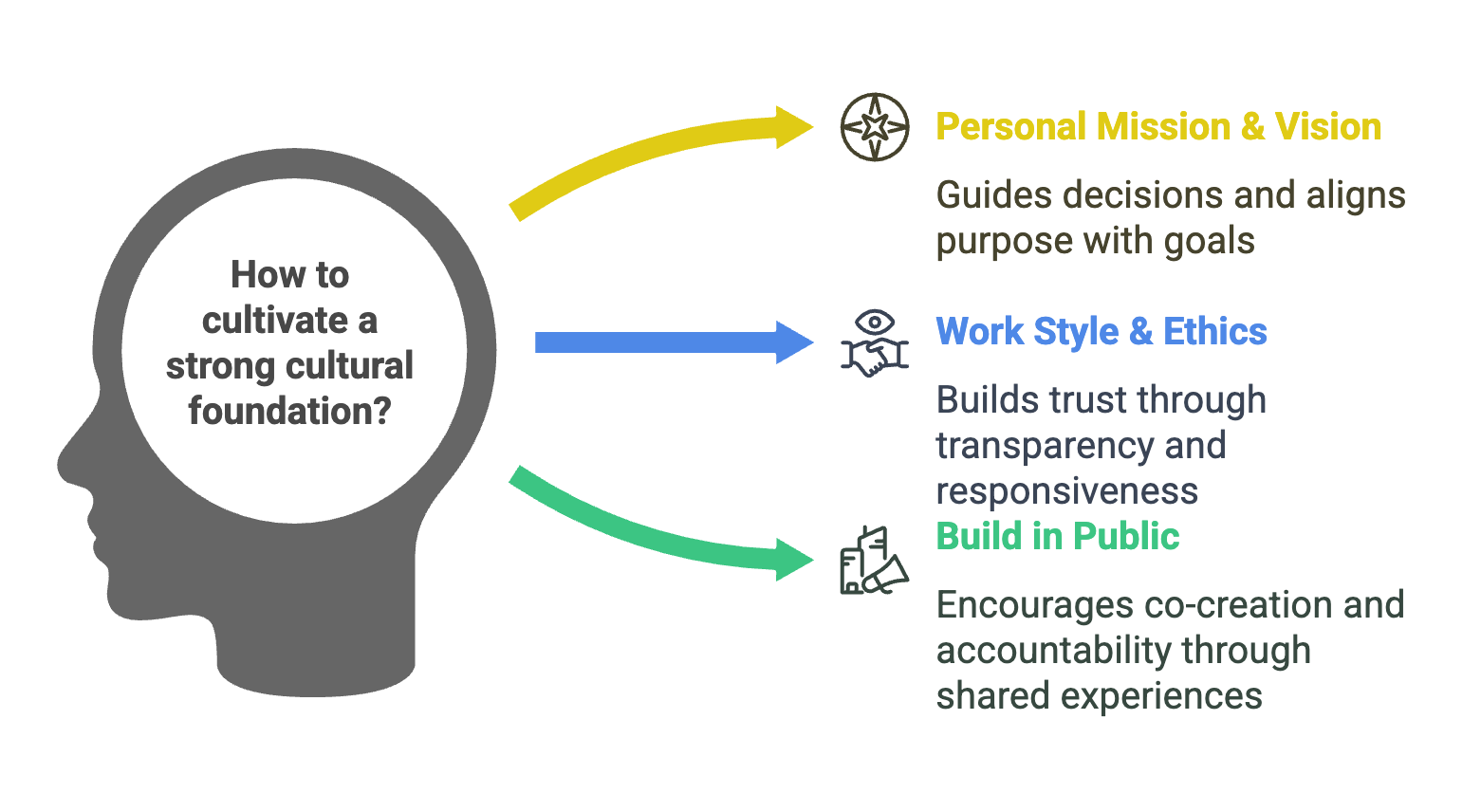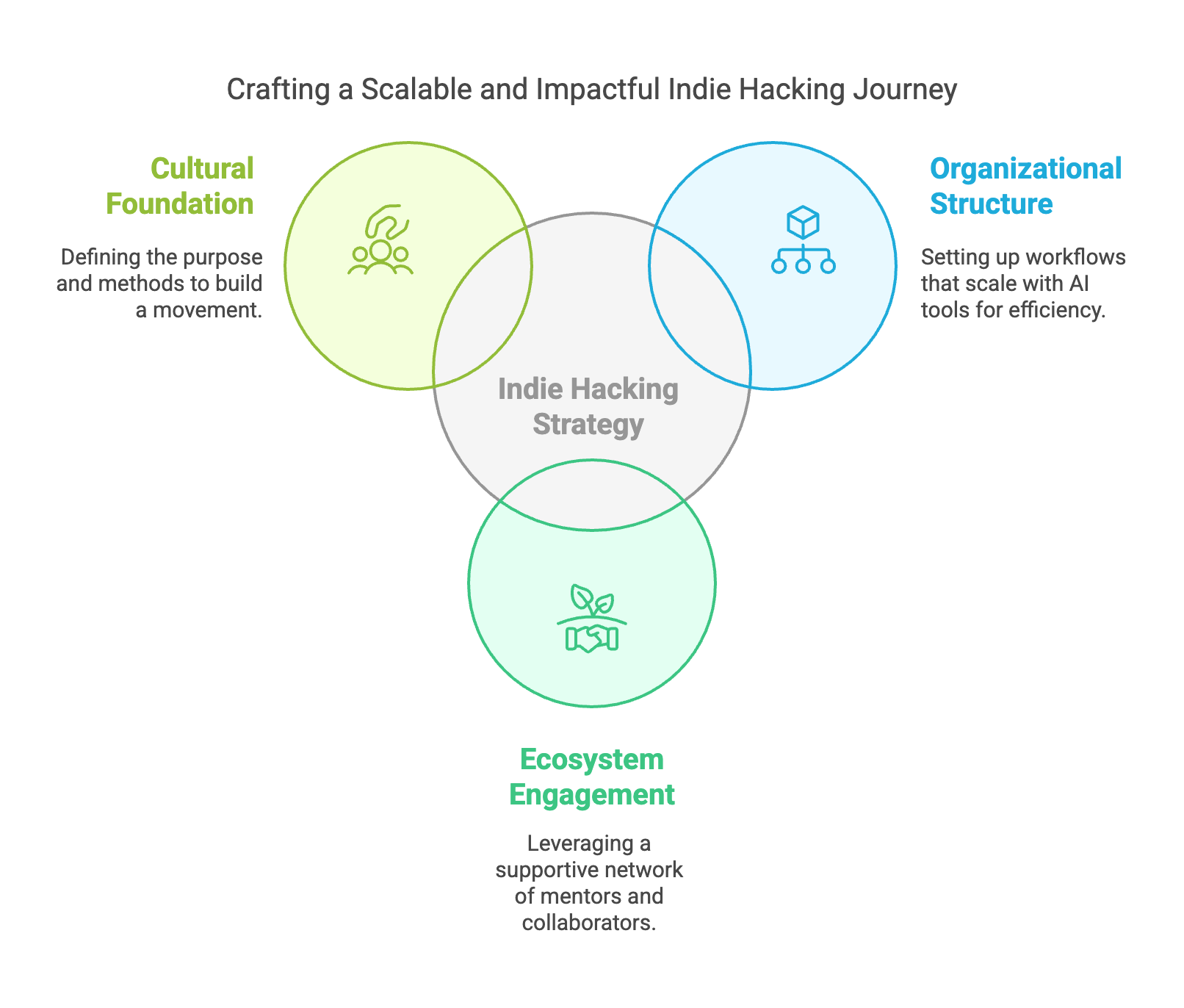Riding the AI Wave, Part 2: How Organization, People, and Culture Empower Solo Indie Hackers

In our last post, we explored Dr. Li Ji Ren’s 5C framework—Context, Change, Choice, Commitment, and Consistency—and looked at how indie hackers can leverage AI to compete in a rapidly evolving tech landscape. Today, as promised, we dive into the second half of this model by focusing on Organization, People, and Culture (“O,” “P,” and “C” in the broader C-SOP framework). Even if you’re running a one-person startup, these ideas aren’t just buzzwords. They can radically transform how you work, how you grow, and how you set yourself apart in the new era of AI-driven entrepreneurship.
1. Organization: When One Person Must Think Like a Team
The Rise of Solo Founders
In recent years, more people have embraced the idea of going solo. According to some industry estimates, the number of single-person businesses in the U.S. rose by over 10% between 2019 and 2023. Much of this growth can be attributed to more powerful automation, AI-assisted coding, and specialized SaaS tools that make it feasible for one person to handle what used to require an entire team. Platforms like Zapier and Make. enable complex workflows without writing much code, and no-code/low-code solutions can handle an ever-increasing range of tasks.
Why It Matters for Organization
When you’re a one-person operation, you can’t afford to run on chaos. Organization is about streamlining tasks—research, design, coding, marketing, customer service, finances—so that you minimize context-switching and maximize productive flow. Think of it this way:
- Tool Consolidation: Pick a minimal set of tools that do the most work. Maybe you use Notion for documentation, Trello for project planning, and GitHub for version control. Reducing the number of platforms you juggle frees up mental energy.
- Automated Workflows: Every repetitive task—onboarding a new customer, sending marketing emails, posting to social media—can often be automated with simple triggers and steps.
- AI-Driven Scheduling and Resource Allocation: AI schedulers and resource management tools (e.g., automatic invoice generation or advanced analytics dashboards) let you dedicate more time to creativity and building revenue-focused features.
2025: The Year of the AI Agent
A new frontier in Organization is emerging with autonomous AI agents—self-contained modules that can perform end-to-end tasks like coding, debugging, or even business analytics, based on prompts or high-level goals. If 2025 is the year these AI agents become mainstream, we may soon see:
- Agentic Workflow: An indie hacker can delegate an entire slice of the business to an AI agent—such as automating client outreach, generating press releases, or even conducting primary market research.
- Reduced Managerial Overhead: Instead of wearing 10 hats, you can focus on the most critical high-level decisions. Agents handle the routine or repetitive parts of product development or operations.
This convergence of AI tools transforms a traditional one-person company into an AI-native indie hacker startup, capable of matching a small team’s output.
2. People: Even a Solo Founder Isn’t Alone
Automation Tools = More Time for Real Connections
Before the AI boom, the trend toward solo entrepreneurship already benefited from automation in marketing, social media scheduling, and customer support. That freed up time to cultivate genuine relationships—whether with customers, collaborators, or mentors. This “people factor” remains crucial because even the smartest AI tool can’t replicate authentic human-to-human rapport.
Growing a Support System
- Mentors and Advisors: You might be solo, but the right mentors can offer fresh perspectives, keep you accountable, and open doors that would otherwise stay locked.
- Communities and Cohorts: Platforms like Indie Hackers, Hacker News, or specialized Slack communities are invaluable for sharing wins, mistakes, and lessons learned.
- Freelancers and Partners: You don’t have to hire full-time. You can pull in specialized freelancers (copywriters, data scientists, digital marketers) on an as-needed basis.
Knowledge-Action Unity
For a solo founder, you are the entire workforce. There’s a concept from Chinese philosophy—知行合一 (often translated as “unity of knowledge and action”)—that emphasizes the importance of aligning what you know with what you do. This is powerful for indie hackers:
- Be the Builder: Don’t get stuck in endless strategy or analysis paralysis. Whether you have an MVP in mind or a marketing experiment, do it. Learn by doing.
- Lead Yourself: You’re the CEO, CTO, CFO, and head of HR, all in one. Leading yourself with discipline and clarity is essential for day-to-day progress.
- Stay True to Learning: With the explosion of AI content and courses, knowledge is never in short supply. Yet knowledge alone doesn’t move the needle—action does.
The Best Gift of Your Life is to harness your passion and act on your knowledge. By uniting insight and implementation, you avoid the trap of “knowing a lot but never building anything.” The moment knowledge becomes practice, it changes your trajectory as an indie hacker.
3. Culture: The Invisible Driver of “Build in Public”
Culture isn’t just for large organizations—it’s the set of values and principles that guide your choices and your interactions. For indie hackers:

- Personal Mission & Vision: Why do you build what you build? Maybe you want to empower freelancers with better scheduling tools, or perhaps you dream of solving a daily pain point for developers. Your mission becomes the guiding star for all your decisions.
- Work Style & Ethics: Are you transparent with your users about how you use AI? Do you respond swiftly to bug reports or feature requests? Culture shows up in these micro-interactions.
- Build in Public: Sharing milestones, failures, and lessons in real time is both a strategy and a form of accountability. It invites your audience to be co-creators, turning them into advocates as you solve problems openly.
Beyond the Gig Economy: A Social Experiment in Cooperation
“Build in Public” can evolve into something more powerful than just personal marketing. It can become a social experiment where:
- Indie Hackers Unite: Multiple indie founders collaborate on open-source AI libraries, data sets, or best practices.
- Collective Economic Growth: Rather than each person fighting for market share, small creators can form ecosystems that benefit everyone—like plugin architectures or shared data channels.
- Culture of Support: Showcasing transparent revenue numbers, code snippets, or even user feedback fosters a community spirit. Instead of a race to the bottom, it becomes a rising tide that lifts all boats.
When we talk about “Gig Economy,” the image might be of freelancers chasing gigs on Upwork. But a culture of building in public and cooperating across small, agile teams can spark a new wave of economic growth—one driven by synergy, authenticity, and innovation at the individual level.
4. Bringing It All Together

- Organization: Set up your work in a way that scales with AI tools. Embrace agentic workflows that handle routine tasks, freeing you to do high-impact, creative work.
- People: Even solo, you’re surrounded by an ecosystem—mentors, collaborators, early adopters, or simply supportive online communities. Practice “知行而一”—turn your knowledge into action day after day.
- Culture: Define the “why” and “how” of your indie hacking journey. Use transparency and collaboration to build not just a product, but a movement.
What’s Next?
As we head into 2025—the year we believe AI agents will take off—start thinking about how to integrate these ideas into your daily work. Test an AI agent for basic tasks, automate your workflows, and design a micro-culture around collaboration and openness. If you do it right, you’ll be well on your way to establishing an AI-native indie hacker company—a powerful and efficient one-person engine that can match or even exceed the output of traditional teams.
A Final Note
You don’t have to wait for anyone’s permission to start. If you have an idea, an internet connection, and a willingness to learn, you can launch something small—then refine it in public until it becomes something significant. This is the magic of the indie hacker era, supercharged by AI. We’re no longer limited by a lack of resources or a massive team; we’re only limited by our own willingness to step forward and build.